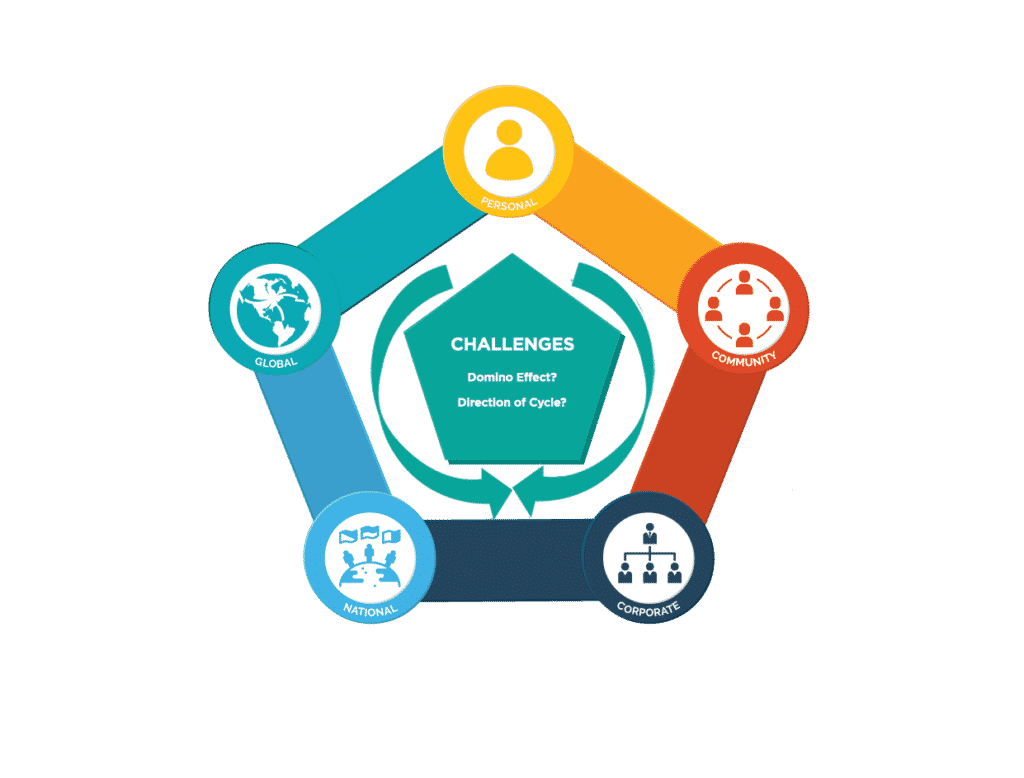I recently gave an open lecture on this subject in Harare. I started off asking if the theme and timing were appropriate.
Why now?
For years, Zimbabwe has been in a self-imposed and sometimes splendid isolation from the rest of the world. But in 2020, what happened in Wuhan or Minneapolis has created a global hurricane and has now come right to our doorstep. This has triggered lockdown regulations, school and other closures and internal and regional travel restrictions. Zimbabwe is in dire need of international financial assistance, so politics, behaviour and decisions made in Washington, London or Beijing directly affect us. On the domestic front, mixed messages of de- and re-dollarisation are causing havoc with our currency and hyperinflation is back on the agenda. This is all translating into economic shrinkage and evaporating business confidence – as a result, employment, real incomes and pensions are sliding fast. This will lead to social unrest and a political reaction. We are all asking ‘what is the new normal?’ Yes, this is an uncertain world and yes, we do need to prepare for it.
To better prepare, we need to assess the dimensions of this uncertain world, always bearing in mind the difficulty of a generic approach, as the perception of challenges of the environment are unique to each of us and we all rationalise them in a different manner. The best I can do is to show you ways of seeing challenges in a different light, provide some basic tools and ensure that you finish this article in a better space than when you started it.
I will do this in three stages.
STAGE 1
Divide up the environmental challenges into slightly more manageable pieces. We do this by dividing ourselves up into the various roles we have – we aren’t just who we are at work:
- We are definitely someone’s child and perhaps someone’s partner so there is a PERSONAL dimension
- COMMUNITY/FAMILY AND FRIENDS – a parent, sibling, friend and community member
- CORPORATE/ WORK LIFE – as a manager or entrepreneur and colleague
- NATIONAL – a citizen of a country
- GLOBAL – increasingly a citizen of the world
I break challenges up into the 5 sided pentagon below to make them more specific and therefore more manageable and understandable and also to allow us to appreciate the direction and linkages as well as any potential domino effect between them. For instance, COVID 19 (global) could lead to lockdown regulations (NATIONAL) and directly affect your business welfare and job security (CORPORATE) – this gives a certain cause and effect on performance. Or perhaps major self doubt (PERSONAL) is disrupting your friendship groups and parenting skills (FAMILY/FRIENDS) and in turn reducing your effectiveness at work and your job security (CORPORATE).

In the lecture I recounted a story that mirrors the environmental challenges we face.
Picture yourself with some friends on a beautiful sunny day, walking along the banks of a flowing river in a game reserve in Africa. It is a beautiful day with spectacular scenery, wild game on the far side of the river, good seasonal rains have greened up the veld and the rivers are in full flow. You want to breathe in the current moment, so move closer to the river’s edge.
Suddenly you slip on soft sand and fall down the steep bank into the flowing river, you go underwater and kick your way back to the surface. The river bank is too steep and the water flowing too fast to get back out – understandably you start to panic, as you have seen crocodiles in the river and you know that there are rapids downstream. What do you do:
- Try and swim back upstream as you know there is a place to get out, but this means fighting against the strong flow – a little bit like going back in time
- Do you go with the flow and hope to find somewhere downstream to get out, but you are anxious about the rapids – a little like anxiety about the future
- Do you give up, tread water and succumb as a casualty to the river – a little like fatalism
- Do you call out for help to your friends or perhaps watch as they are more panicked than you are and feel helpless, and you need to calm them down
- Do you weigh up risk and reward and look out for a tree trunk or pontoon and swim vigorously towards it
So what are the messages from this short story? We in Africa are on an equally dramatic roller coaster – with ample challenges, both financial and emotional, but we do have choices, have got to take into account specific environmental factors and we do need to focus on the present moment.
Stage 2
Provides you with five tools for your armoury against the environmental challenges of this uncertain world. These tools need to be worked on and developed into habits to become truly effective:
1. You Control More Than You Think You Do
Every day, in every circumstance, you have four choices to make:
- You have the right to choose how to RESPOND to an event, circumstance or thought
- The choice to ACT or not – will you act upon life or merely be acted upon?
- The choice of PRINCIPLE, i.e how you want to conduct yourself
- The choice of PURPOSE i.e. Why do you do something, what is the MEANING behind your actions
Since these are your choices, you have control over them, but you need to take responsibility for these choices.
2. Think Through, Understand & Compartmentalise Challenges
This requires deep reflection, so take any issue back to its root causes and really understand it. Perception is still not reality and perspective and understanding can reduce an issue to manageable and bite-sized proportions. At the end of the day, appreciation of a subject improves conviction and gives you confidence; confidence in turn reduces anxiety. This is called following first principles – challenge every assumption and statement until you understand it and only the basic facts remain – if not to seek the absolute truth, at least to eliminate the falsehoods and provide some objectivity over the myriad of opinions. Once you better understand the origins and scope of an issue or challenge, it is easier to compartmentalise it.
When someone is stressed, they tend to focus on the generalities. You need to bring them back to specifics, which are more concrete, manageable and grounded. In all cases, be non judgmental.
3. Don’t Absorb Collective Problems
We all agonise about the mainstream news media sensationalising negativity and rightly so. But we are equally bad, as social media and our addiction to it has resulted in the risk of us absorbing everyone’s concerns, fighting their battles, feeling their pain and then talking about it and disseminating it. So desist and be there to help, as you serve no value if you, yourself become part of the debilitating chain.
In everything, life is relative – there is always someone worse off than you – remember this relativity and be guided by the ancient saying: ‘I wept because I had no shoes, until I saw a man who had no feet.’ Be grateful for what you have and remember that these two acts (gratitude and selflessness, like forgiveness) are twice blessed – blessed to the receiver, but also to the giver – they are uplifting and so practise them regularly
4. Every Coin Has Two Sides & Beware the Second Arrow
Every coin has two sides – if you feel or think that you have been dealt a rough hand, have a look on the other side. Whilst perhaps not the flavour of 2020, the Chinese symbols that represent the word CRISIS are made up of two characters – DANGER and OPPORTUNITY. Dig deep and find a positive in every challenge.
Beware the second arrow – the first arrow is an initial annoyance or frustration, so only grazes us. The second arrow is more devastating as it creates emotional turbulence or stress in its wake – the indignity, futility or helplessness of a first arrow are followed by anger or depression that can well up and remain with us over time – this is the second arrow. An example may be a roadblock, where the first arrow is the annoyance of a 5-10 delay, but the second arrow is where your emotions start to run away from you and by the time you roll the window down to talk to the officer, you and angry and potentially verbally abusive – in many cases, that one passing incident ruins the rest of your day.
We are reminded of Hanlon’s Razor, which is – never attribute malice to that which can be explained by neglect, absent mindedness, incompetence or stupidity. Be measured and watch out for the second arrow – stand tall, breathe and don’t let your emotions spiral out of control. This requires emotional intelligence – that ability to manage your own emotions and those of others.
5. Focus On The Here & Now
We are easily distracted by the more sensational but less useful, informative or progressive issues – we need to stay focused on the important items affecting us, including relationships – these also require attention and focus, especially in empathetic listening. On the issue of time, we often are drawn on the regret or despair of what happened in the past or anxiety of what might happen in the future – little time is spent on what the actual problem affecting us right NOW – the most valuable and underrated point in time – there is no other. Meditation or quiet reflection helps with these.
Stage 3
Identify, group and rationalise some of the common challenges we face every day in each of our roles. Here are a selection of challenges from my own experience and feedback from family, friends and course participants:
1. As an INDIVIDUAL in our PERSONAL ENVIRONMENT
- Loss, which is anything that is no longer, missing and makes you feel empty – family, friends, divorce, health, job, livelihood, pension, self-respect. You will notice that there are no possessions on this list Fear & Insecurity about our future
- Blame & Criticism – this provides temporary relief from the pain, but it also chains us to these very problems
- Hopelessness – if we believe we are victims of circumstance, and yield to fate, we lose hope and drive
- Personal Stagnation occurs when you resist life and its four dimensions of Body (moving from a culture of medication to a lifestyle principle of preventative health), Mind (shifting from being entertained to educating yourself), Heart (using others to serving and listening to others) and Spirit/Soul (cynicism to the principles of meaning and positivity)
2. As a FAMILY MEMBER
You are a product of your upbringing so what challenges shall we focus on regarding the growth and development of our children.
3. As a WORK COLLEAGUE or MANAGER
the challenges within this environment are extremely important to address as this is where you could spend 90% of your day:
- Values: Do your own personal values and beliefs match those of your company? Are you asked to do things you’re uncomfortable with – do you have the courage to stand up for yourself
- Viability: Is the company strong financially and able to withstand the current economic environment – will I have a job after this COVID period
- Does remote working suit me and can I survive on my ever-reducing real income
- Is there a path for me to grow & develop
4. Our role as a CITIZEN of a country
This is an essential one as we all feel that we have inalienable citizens’ rights, but ask ourselves the questions about:
- Living in a one party dominant state without all the checks and balances: Do you feel powerless as a citizen? We need to learn to differentiate between what we can and cannot control in pursuit of justice and human dignity
- Bribery & Corruption: Both in the private and public sector – what can I do to combat this?
- Economic Chaos: Do I or my business have the capacity to weather hyperinflation? Who are the winners and losers?
5. As a GLOBAL CITIZEN
As a member of the human race, we are increasingly GLOBAL CITIZENS and drawn into considerations like:
- Biotechnology & IT: Will we fall prey to fast moving technological advancements – who will benefit and what price will these come at. What kind of jobs will be created?
- Society & Politics: Who will drive the next phase of our civilisation with the rise of nationalism and the focus on immigration and trade wars? The values we reinforce should drive all political manifestos, i.e. fairness, service, industry and human dignity
- Fake News: What is true and just in this world of unlimited, instant access to information? Here, clarity is power so apply the first principles tool
- Pandemics: WHO estimates that depression will impose the second biggest health problem globally by 2020, along with its cousin – chronic anxiety. They are overtaking happiness and contentment as the normal human condition
Alfred Whitehead, the British 19th Century philosopher wrote:
“The art of progress is to preserve order amid change, and to preserve change amid order”
We all want progress, but is it progress when a cannibal dresses for dinner? Recent change has come with widespread disorder, and it comes with a dearth of global and national leadership.
As an individual, when you become comfortable with uncertainty and change, infinite possibilities open up in your life. You will not merely need to invest in new ideas and products – you will above all need to reinvent yourself, again and again. But to survive in such a world, you will need a lot of mental flexibility and great reserves of emotional intelligence.
So in conclusion, our world is being turned upside down, but we do have the capacity to adapt and contribute. There are five tools listed above, but the Masterclass in Personal Effectiveness (www.jdlfmasterclassafrica.com) goes much further in training you how best to manage your own personal development and be able to rise to these challenges. It looks at the importance of paradigms and the lens through which you see the world and your role in it, before advancing to steps towards being more proactive, having a clearer vision of your future in all your roles and then prioritising your goals in getting there. It covers the art and science of habit formation, meditation and the all important skills in developing relationships and finding personal balance.
Sign up for our next Masterclass in Personal Effectiveness here



Recent Comments